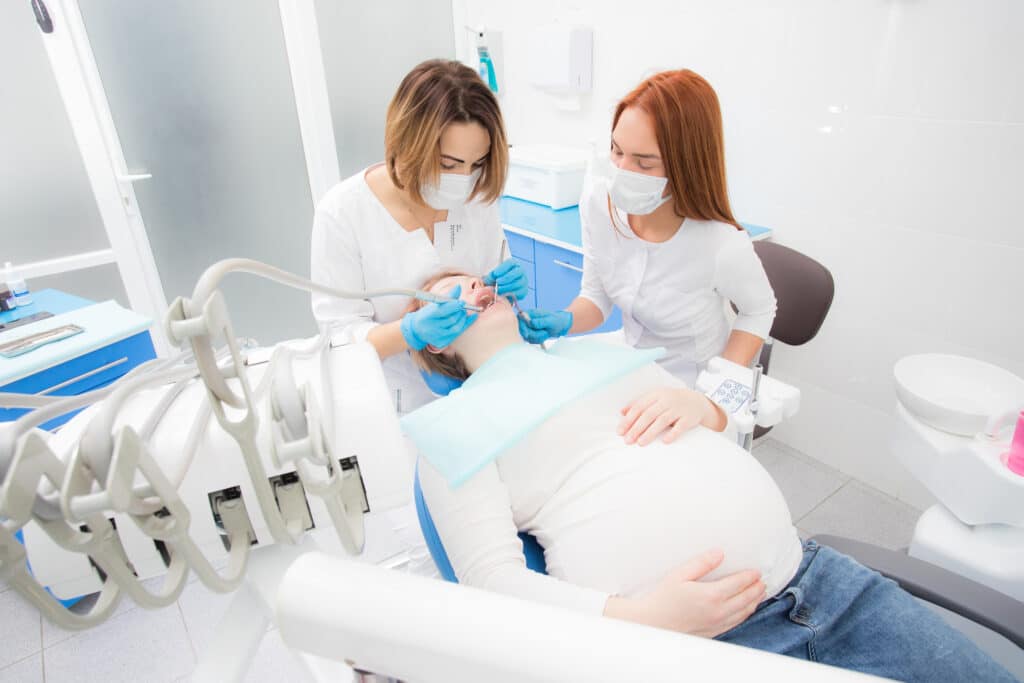
There are a lot of changes that occur during pregnancy, and it isn’t uncommon for people to experience worsening dental problems throughout. With an increase in estrogen and progesterone and more frequent morning sickness, there is an increased risk of worsening oral health. In addition to the increased risk of cavities, it isn’t uncommon for your dentist to determine that you need a root canal during your pregnancy.
However, you may not know whether you can safely get a root canal during your pregnancy or if there are any risks associated with the procedure. At David G. Johnson, DDS, our team wants you to understand the ins and outs of getting a root canal when you are pregnant. If your dentist or endodontist has recommended a root canal during your pregnancy, keep reading to learn more about the procedure.
Can You Get A Root Canal During Your Pregnancy?
While we know there are many myths about receiving oral care during your pregnancy, it is important to know that many myths have no basis. You should be scheduling regular appointments with your dentist prior to pregnancy, which should protect you from cavities and the need for root canals.
However, if you haven’t gone in for a routine checkup with your dentist recently, you should schedule one once you find out you’re pregnant. At this appointment, they may determine that some cavities have progressed too far and you need to get a root canal during your pregnancy. While we know this might seem intimidating, getting a root canal during pregnancy is completely safe.

When Should You Schedule Your Root Canal During Your Pregnancy?
If you’re ready to schedule your root canal, you might wonder if there is an appropriate time for this procedure to take place. When it is time to schedule your root canal during your pregnancy, it is best for you to schedule this during your second trimester. For many pregnant people, scheduling your root canal between 14 and 20 weeks is best.
You will likely want to avoid a root canal during the first trimester of your pregnancy to prevent any risky procedures while the pregnancy is still so new. After the third trimester of pregnancy ends, you may schedule a root canal, although you may find it too uncomfortable to lay on your back during the procedure.
Do You Have To Get X-Rays Before Your Root Canal?
While there are many X-rays you can avoid during your pregnancy, the X-ray before a root canal is not one of them. The American Pregnancy Association states that dental X-rays should be safe as long as adequate shielding is available. This shielding should come from your endodontic team, who will offer you an apron to protect you and your baby from radiation exposure.
It is important that you don’t try to put off this X-ray prior to the root canal during your pregnancy. While we are sure you’re nervous about the X-ray, it is essential to ensure your root canal is successful is essential. Your endodontist will use the X-ray to guide them through your tooth and ensure it is properly filled after removing the infected tissue.
Are There Anesthetic Options For A Root Canal During Your Pregnancy?

You may worry about the use of anesthetic when undergoing a root canal during your pregnancy. However, there is no need to worry. The American Dental Association does say that you may use local anesthesia during a dental procedure. However, your endodontist will likely follow the recommendation of the American Pregnancy Association.
They recommend using as little anesthesia as possible when performing dental procedures during pregnancy. It should be just enough to make you comfortable throughout the duration of the procedure. It is best to ask for additional numbing if you don’t find the initial amount satisfactory.
Can You Take Medication After Your Root Canal While You’re Pregnant?
After your root canal, your endodontist may prescribe you an antibiotic to help prevent any reinfection of the affected tissue. Many antibiotics, including penicillin, cephalosporin, and clindamycin, are safe to take during pregnancy. Your endodontist will only prescribe the safest antibiotic dosage, but if you are worried, you may want to discuss this medication use with them.
In addition to taking an antibiotic after your root canal, you may want to take pain medication. Your endodontist will likely not prescribe a pain medication, as they are often unnecessary following the procedure. However, if you are feeling a bit of discomfort, you may take acetaminophen. You should avoid taking NSAIDs (such as ibuprofen) for the duration of your pregnancy.

How Can You Care For Your Teeth During Pregnancy?
With many people reporting increases in tooth sensitivity during pregnancy, it is essential that you care for your teeth to the best of your ability. You should continue brushing your teeth at least twice daily using fluoride toothpaste. Due to the increased risk of gingivitis during pregnancy, your gums may be more sensitive and bleed more often.
To avoid this, switch to a soft bristle toothbrush. If morning sickness makes brushing your teeth too difficult, you should rinse your mouth with water and baking soda. You should also continue seeing your dentist as normal to ensure you aren’t experiencing any cavities or other problems, and avoid any sugar-rich foods and beverages. Finally, remember to floss every day to help maintain healthy gums.
Schedule Your Root Canal With A Trusted Endodontist
Many people experience anxiety around dental procedures, and root canals are no different, especially when you need a root canal during your pregnancy. While we know this procedure is intimidating, working with a trusted endodontist during your root canal can help alleviate some of this anxiety. Dr. David Johnson has been a practicing endodontist in Northern Utah since 1990, and we are confident that he can help you through any root canal procedure.
In addition to our exceptionally trained endodontist, our team can help make this entire process smooth and alleviate any fear you may be experiencing. If you are interested in scheduling a root canal during your pregnancy or would like to speak to a member of our team, contact us at our Layton or Centerville office today!


